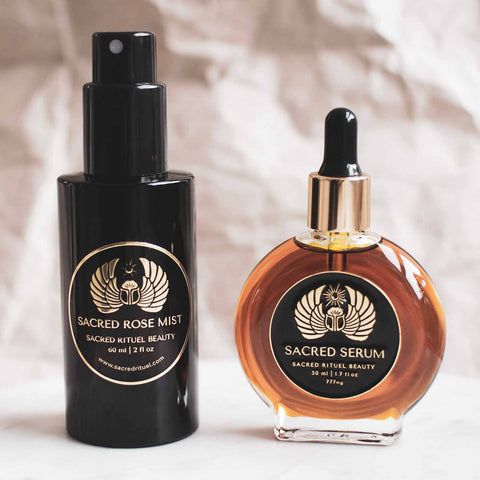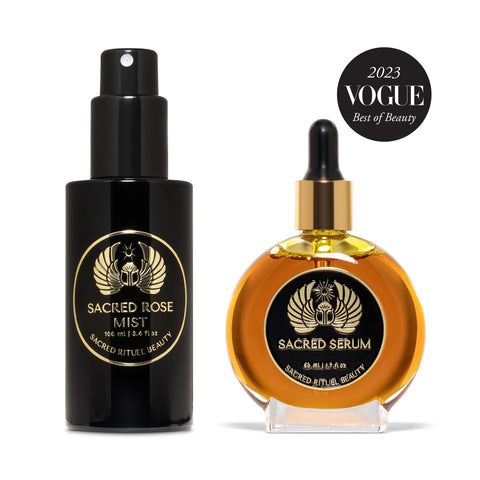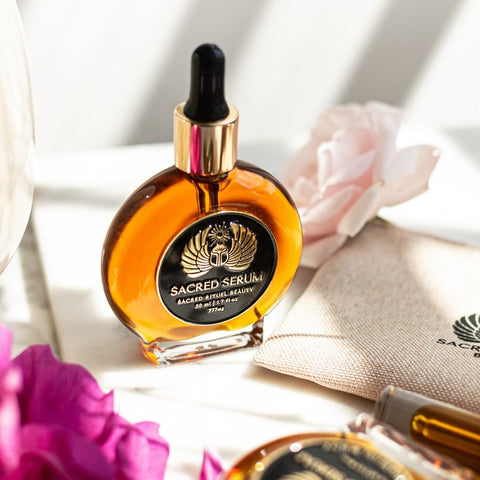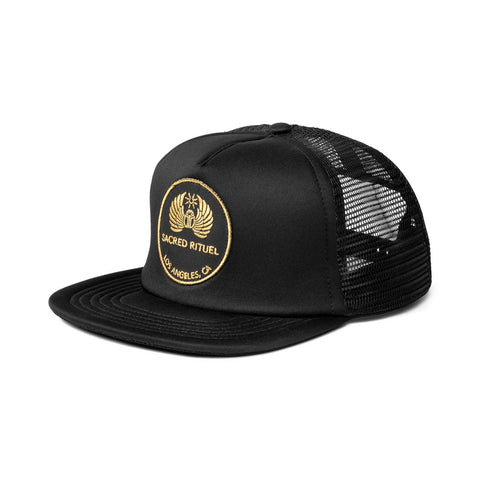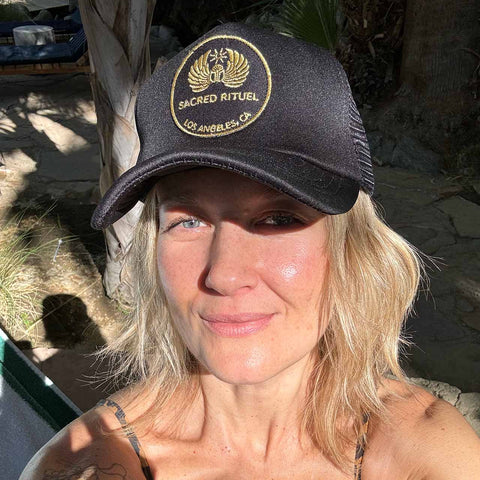Understanding Acne Rosacea Treatment
At Sacred Rituel, we understand the unique challenges that come with sensitive and rosacea-prone skin. As a brand rooted in promoting organic and natural skincare, our expertise lies in creating solutions that work harmoniously with your skin—not against it. You can trust that the information and advice shared here are guided by our commitment to gentle, effective care for your skin’s health.
Products formulated with Green Tea to address inflammation and oxidative stress.
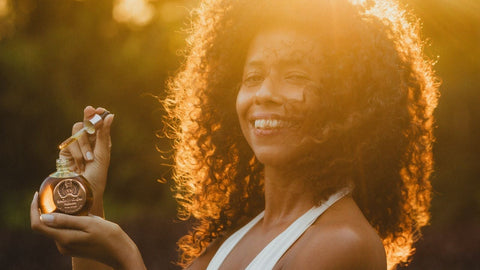
Key Takeaways:
- Understanding Rosacea: Acne rosacea is a chronic skin condition characterized by redness, sensitivity, and flare-ups, but it can be effectively managed with the right treatments and care.
- Natural and Lifestyle Approaches: Natural remedies like chamomile, jojoba oil, and sea buckthorn oil, combined with lifestyle changes such as avoiding triggers and using gentle skincare, can significantly reduce symptoms.
- Professional Help is Available: For severe cases, professional treatments like laser therapy or microneedling can provide long-term relief and improve the appearance of rosacea-affected skin.
What Is Acne Rosacea?
Acne rosacea is a common skin condition that mostly affects the face. It often shows up as redness across your cheeks, nose, forehead, and chin. You might also notice small, pimple-like bumps, visible blood vessels, or even thicker skin in some areas.
Despite the name, acne rosacea isn’t the same as regular acne. It’s more like a mix of redness and sensitivity with occasional flare-ups of bumps. It’s a chronic condition, which means it doesn’t just go away on its own, but the right treatments can keep it under control.
This condition is more common in people with fair skin and tends to develop after the age of 30, but it can happen to anyone. It’s not harmful to your health, but it can impact how you feel about your skin, which is why learning how to manage it is so important.
What Causes Acne Rosacea?
The exact cause of acne rosacea is still a bit of a mystery, but researchers believe it’s a combination of genetics, environmental factors, and an overactive immune response. Here’s what we do know:
- Genetics: If someone in your family has rosacea, you’re more likely to develop it too. There seems to be a hereditary component at play.
- Triggers: Certain triggers can make rosacea flare up. Common ones include spicy foods, alcohol, extreme temperatures, stress, and even sun exposure. These don’t cause rosacea directly but can make symptoms worse.
- Skin Sensitivity: Many people with rosacea have sensitive skin that reacts strongly to irritants, including skincare products with harsh ingredients.
- Demodex Mites: These tiny mites naturally live on everyone’s skin, but people with rosacea might have higher numbers of them, which could irritate the skin.
- Blood Vessel Abnormalities: Rosacea is often associated with dilated blood vessels, which can lead to that persistent redness.
While these factors don’t give us a single clear cause, understanding them can help you identify your own triggers and make managing rosacea easier.
Natural Treatments For Acne Rosacea
When it comes to calming acne rosacea naturally, gentle and nourishing ingredients can work wonders. Here are some fantastic natural options that people with rosacea often swear by:
Chamomile
Chamomile is well-known for its soothing properties, both as a tea and in skincare. It can help calm redness and irritation, making it a great choice for sensitive rosacea-prone skin. Look for chamomile extracts in creams or use cooled chamomile tea as a gentle face rinse.
Calendula
Calendula, or marigold flower, is another skin-calming superstar. It’s packed with antioxidants and anti-inflammatory properties, helping reduce redness and irritation. Try calendula-infused oils or creams for a gentle touch.
Jojoba Oil
Jojoba oil is lightweight and easily absorbed, making it ideal for skin that needs hydration without clogging pores. It helps restore your skin’s natural moisture barrier, which is often compromised in rosacea. Plus, it’s rich in vitamins E and B, which help repair and strengthen sensitive skin over time.
Sea Buckthorn Fruit Oil
Sea buckthorn fruit oil is a powerhouse of nutrients, loaded with omega fatty acids, vitamin C, and antioxidants. It’s especially beneficial for calming redness and repairing the skin barrier, which can be weakened in rosacea. Just remember, it’s a bright orange oil, so a little goes a long way to avoid staining your skin or clothes.
Rose Hip Oil
Rose hip oil is packed with essential fatty acids and vitamins like A and C, which are known for their skin-repairing and anti-aging properties. It can help reduce visible redness, improve skin texture, and fade any discoloration over time. Its lightweight, non-greasy texture makes it a popular choice for people with rosacea who want hydration without irritation.
Calm And Nourish: How Sacred Glow Serum Supports Acne Rosacea Treatment
At Sacred Rituel, we understand the challenges of managing acne rosacea. That’s why we created Sacred Glow Serum, a gentle yet powerful botanical face oil designed to soothe, nourish, and restore balance to even the most sensitive skin types. Here’s why it’s a great choice for your rosacea journey:
- Gentle on Sensitive Skin: The lightweight, cold-pressed oils in Sacred Glow Serum are free from harsh chemicals, synthetic fragrances, or irritants, ensuring your skin gets the care it needs without triggering flare-ups.
- Anti-Inflammatory Superfoods: Ingredients like Chamomile, Calendula, and Helichrysum work together to reduce redness, calm irritation, and promote a more even complexion.
- Deep Hydration Without Clogging Pores: Acne rosacea requires moisture to repair the skin barrier, but heavy products can worsen breakouts. Sacred Glow is non-comedogenic and absorbs quickly, delivering hydration without leaving a greasy residue.
- Strengthens Skin’s Natural Barrier: Oils like Marula, Rosehip, and Jojoba are rich in vitamins A, C, and E, which strengthen the skin barrier, protecting against environmental stressors that can exacerbate rosacea.
- Reduces Visible Signs of Stress: Lavender, Frankincense, and Rose oils provide a soothing aromatherapy experience while targeting fine lines, uneven texture, and skin tone.
Sacred Glow Serum is your partner in soothing and nourishing acne rosacea-prone skin. With every drop, you’re treating your face to a blend of nature’s most healing oils—bringing comfort, balance, and beauty back into your skincare routine.
Lifestyle Changes To Manage Symptoms
Managing acne rosacea isn’t just about treatments—it’s also about making small but impactful changes to your daily routine. These lifestyle tweaks can help you avoid triggers and keep flare-ups under control:
Protect Your Skin From The Sun
Sun exposure is a major trigger for many people with rosacea. Always wear sunscreen with at least SPF 30, even on cloudy days. Opt for mineral sunscreens with zinc oxide or titanium dioxide, as they’re gentler on sensitive skin.
Simplify Your Skincare Routine
Keeping your skincare routine simple is key to avoiding unnecessary irritation. Use a gentle, fragrance-free cleanser and a lightweight serum or moisturizer to keep your skin clean and hydrated without clogging pores. Avoid harsh scrubs, exfoliants, or alcohol-based products that can strip your skin and make redness worse.
Identify Your Triggers
Everyone’s rosacea triggers are different, so it’s helpful to keep a journal to pinpoint yours. Track your diet, skincare products, stress levels, and environmental factors when you notice a flare-up. Once you identify your triggers, you can take steps to avoid or minimize exposure to them, making flare-ups less frequent.
Stay Cool—Literally
Heat can make redness and flushing worse, so try to keep your environment cool and comfortable. Avoid hot showers, saunas, and steaming hot drinks, as they can dilate blood vessels and lead to flare-ups. Instead, opt for lukewarm showers and iced or room-temperature beverages to help your skin stay calm.
Manage Stress
Stress has a sneaky way of making rosacea symptoms worse, so it’s worth finding ways to unwind. Activities like yoga, meditation, or even a few deep breaths during a hectic day can help lower stress levels. Making time for things you enjoy, like reading or walking outdoors, can also keep your mind and skin happier.
Eat A Skin-Friendly Diet
Certain foods can either help or hurt when it comes to managing rosacea. Anti-inflammatory options like leafy greens, berries, salmon, and flaxseeds can support calmer skin. Try to avoid spicy foods, alcohol, and processed sugars, which are common triggers for redness and inflammation.
Professional Procedures For Severe Cases
If your acne rosacea symptoms are severe or not improving with natural remedies and lifestyle changes, it might be time to consider professional treatments. Dermatologists have several effective options that can target redness, bumps, and visible blood vessels. Here are the most common ones:
Laser Therapy
Laser therapy, like pulsed dye lasers (PDL) or intense pulsed light (IPL), targets blood vessels beneath your skin to reduce persistent redness and visible veins. The treatment is quick, often taking less than an hour, and most people experience only mild discomfort, like a rubber band snap. Results aren’t instant—you may need a few sessions—but the effects can last for months, significantly reducing redness.
Microneedling With Radiofrequency
This advanced procedure combines microneedling with radiofrequency energy to stimulate collagen production, which can help reduce inflammation and improve skin texture. It’s especially useful for thickened skin in advanced cases of rosacea.
Dermabrasion Or Electrosurgery
Dermabrasion removes the thickened outer layers of skin using a controlled abrasion technique, while electrosurgery uses electrical currents to precisely reshape affected areas. These procedures are particularly effective for rhinophyma, where rosacea causes thickening of the nose. While the recovery period can be a bit longer, these treatments can dramatically improve the skin’s appearance and texture.
Prescription Medications
If topical or oral treatments haven’t worked well in the past, a dermatologist might prescribe medications like ivermectin or azelaic acid alongside procedures. These medications target inflammation and the overgrowth of skin mites, both of which are common in rosacea. Used in combination with professional treatments, prescription options can amplify results and keep symptoms in check.
Chemical Peels
Chemical peels for rosacea are tailored to be gentle, often using mild acids to exfoliate and renew the skin without causing irritation. They can help with reducing redness, improving skin texture, and addressing minor bumps. Performed by a professional, these peels are a safe way to enhance your skin’s overall appearance and feel refreshed.
Read also:
- Facial Oils And Hormonal Acne: A Natural Skincare Approach
- Sensitive Skin Care Products: What You Need To Know
- The Amazing Benefits Of Rose Water On Your Skin
Frequently Asked Questions About Acne Rosacea Treatment
How do you get rid of rosacea acne fast?
While there’s no overnight cure, you can reduce rosacea acne quickly by applying anti-inflammatory treatments like azelaic acid, using soothing products like chamomile or calendula, and avoiding known triggers like spicy foods or hot beverages. Consulting a dermatologist for professional advice is also a great step.
Is acne rosacea treatable?
Yes, acne rosacea is treatable! While it’s a chronic condition, proper treatments—ranging from topical and natural remedies to professional dermatological procedures—can help manage symptoms effectively.
What is the best treatment for rosacea?
The best treatment varies by individual, but commonly recommended options include gentle skincare, azelaic acid or ivermectin creams, and lifestyle adjustments. For severe cases, laser therapy or prescription medications may be necessary.
What is the biggest trigger for rosacea?
Sun exposure is one of the most common and significant triggers. Using sunscreen and wearing protective clothing can help minimize its impact.
How long do rosacea pimples last?
Rosacea pimples can last for a few days to weeks, depending on how quickly they’re treated and whether triggers are avoided. Early intervention with soothing and anti-inflammatory treatments can shorten their duration.
Why have I suddenly got acne rosacea?
Rosacea can develop suddenly due to genetic predisposition combined with lifestyle or environmental changes, such as increased stress, sun exposure, or new triggers in your routine.
Is ice good for rosacea?
Ice can temporarily reduce redness and inflammation during a flare-up, but it’s important to wrap it in a soft cloth to avoid irritating sensitive skin.
How can I stop rosacea?
While rosacea can’t be "cured," you can control it by avoiding triggers, using gentle skincare products, wearing sunscreen daily, and following a dermatologist-recommended treatment plan.
How did I heal my rosacea naturally?
Many people find relief by using calming natural ingredients like chamomile, calendula, or jojoba oil, alongside lifestyle changes like avoiding triggers, eating an anti-inflammatory diet, and reducing stress.
SACRED TRIO | SERUM + ROSE TONER + BODY OIL
Prix régulier$229.00 Prix de soldeSACRED TRIO | SERUM + ROSE TONER + BODY OIL
Prix régulier$229.00 Prix de solde

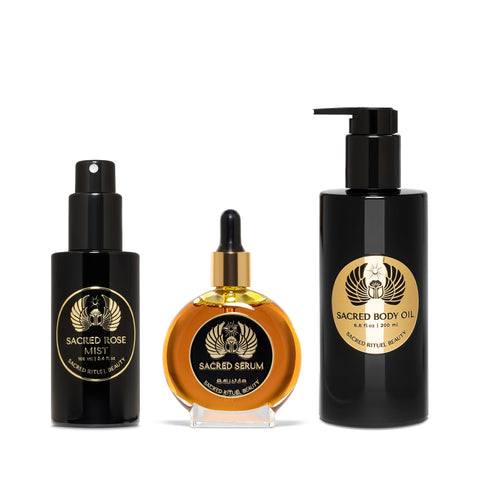
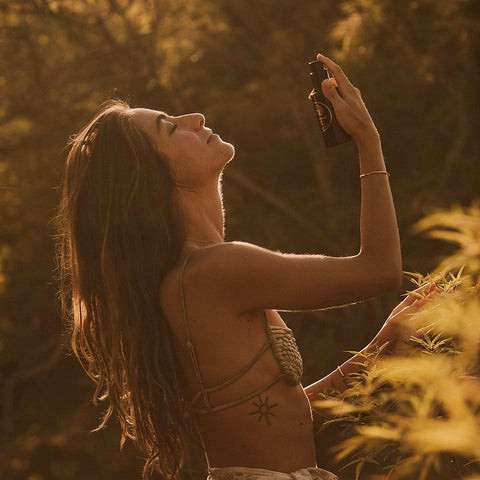
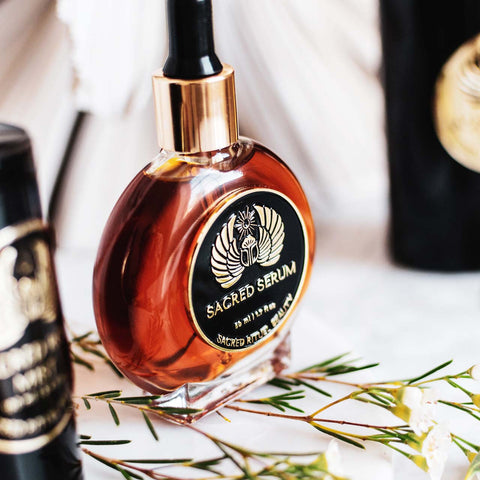
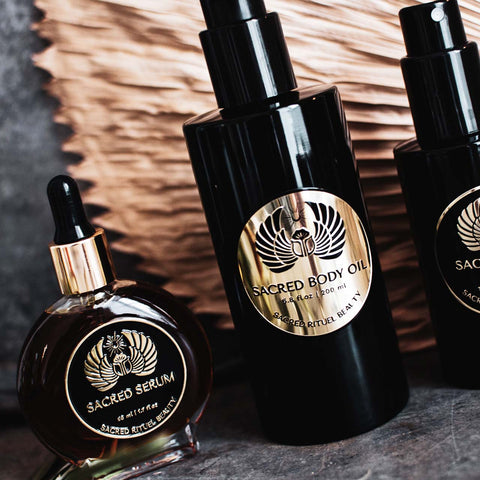
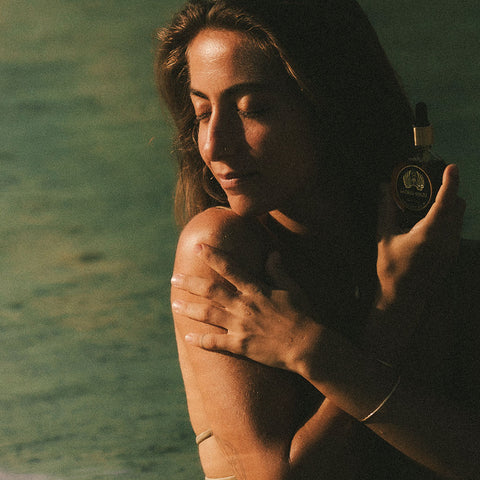
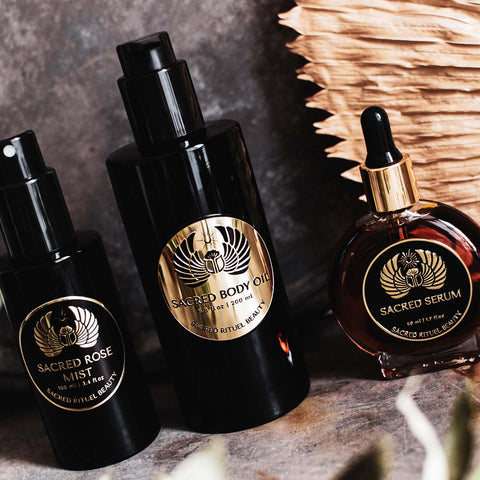
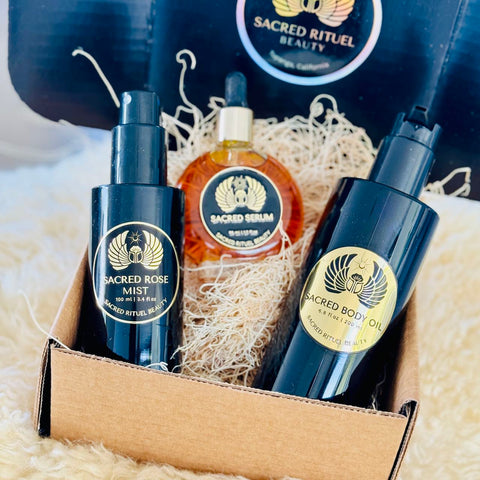
All Day Glow Essentials
Livraison express gratuite sur les commandes de plus de 100 $
Dépensez 100 $ et obtenez la livraison express GRATUITE. Dépensez 50 $ et obtenez la livraison standard GRATUITE. Livraison économique de 5 $ sur toutes les autres commandes.
Détails dans notre politique d'expédition .
Livraison automatique avec abonnement
Assurez-vous d'avoir TOUJOURS un flux constant de SACRED RITUEL à portée de main !
Détails dans notre page d'abonnements .
Retours sans tracas sous 30 jours
Essayez SACRED RITUEL pendant 30 jours et renvoyez-le pour un remboursement complet s'il ne répond pas complètement à vos attentes.
Détails dans notre politique de retour .
RITUEL SACRÉ est
Soins de la peau bio à haute puissance
Bulletin
Restez connecté sur les conseils de bien-être, les ventes exclusives et les événements !

